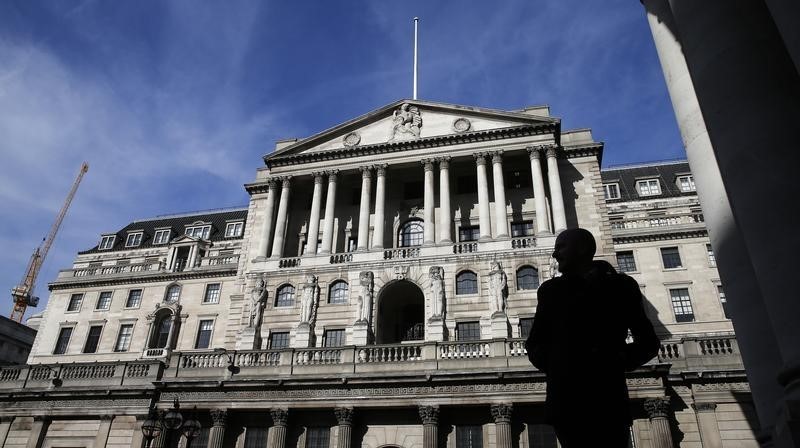By William Schomberg and David Milliken
LONDON (Reuters) - The Bank of England pointed to a possible increase in interest rates early next year, after only one of its top policymakers backed an immediate move and the Bank forecast a slow pick-up in inflation from zero thanks to a strong pound.
Sterling fell sharply and investors briefly pushed back their bets on a first rate hike until June next year, before BoE Governor Mark Carney said the time was getting closer for the Bank to start undoing its stimulus for Britain's economy.
He also warned markets not to be too relaxed in the path or 'curve' that it predicts for rates. "The market curve does not deliver a sustainable return of inflation to target, because there is an overshoot," Carney told a news conference.
The BoE slashed interest rates to 0.5 percent in the depths of the financial crisis in 2009 and has kept them there ever since. With the economy now recovering strongly and wages finally rising quickly, speculation is growing about when it might decide to start weaning Britain off low rates.
The Bank said it expected inflation to be back to target in two years' time. That was in line with its previous forecast, made in May, despite a renewed plunge in oil prices and a strengthening of sterling since then.
But inflation was forecast to rise above 2 percent later in 2017, a point Carney stressed as he noted that markets had not priced in a rate rise until late in the second quarter of 2016.
Investors were taken by surprise earlier when the Bank said only one of its nine policymakers had voted for a rate hike at their August meeting, which ended on Wednesday.
Most economists taking part in a Reuters poll had expected two or even three members of the Monetary Policy Committee to vote for a rate hike. The surprise 8-1 result prompted markets to push out their bets on a first rate hike.
Only Ian McCafferty voted against the majority. He backed rate hikes last year along with fellow MPC member Martin Weale but they rejoined the fold in January as oil prices tumbled.
As Carney spoke on Thursday, bets on a June 2016 rate hike were reined in, Jason Simpson, a UK rate strategist at Societe Generale (PARIS:SOGN). "The message is clear -- rates need to rise. Not yet, but they need to go up and every inflation report is one step closer to that."
Few economists expect the BoE to move before the U.S. Federal Reserve, which is expected to raise rates this year.
The Bank said its forecasts were based on bets in financial markets that interest rates would only start to rise in the second quarter of 2016. Economists mostly expect a first rate hike in February.
Three weeks ago, Carney said the decision when to hike interest rates would likely come into "sharper relief" around the end of the year. He emphasised on Thursday that this was his own view and that it had not changed since.
FOCUS ON STERLING
The Bank stressed how a recent strengthening of the pound and a renewed fall in oil prices would push down inflation until at least the middle of next year and said the impact of the rise in sterling could persist even longer.
Some members of the MPC saw a risk that inflation could pick up more strongly than the central forecast, the BoE said.
But the tone of the minutes and the Bank's quarterly economic forecasts -- which were released together with the interest rate decision for the first time -- suggested it was focused on how the stronger pound could keep a lid on inflation.
Stock market turmoil in China and Greece's debt problems cast only a small shadow on the global outlook, the BoE said.
The BoE also noted that Britain's weak productivity growth was finally on the rise, which would also help mute inflation even after wages grew surprisingly strongly in recent months.
It said it was unclear if a recent fall in employment reflected less demand or more problems for firms to find staff.

The Bank raised its forecasts for Britain's economic growth this year to 2.8 percent from 2.5 percent and kept its growth projections for the following years largely unchanged.